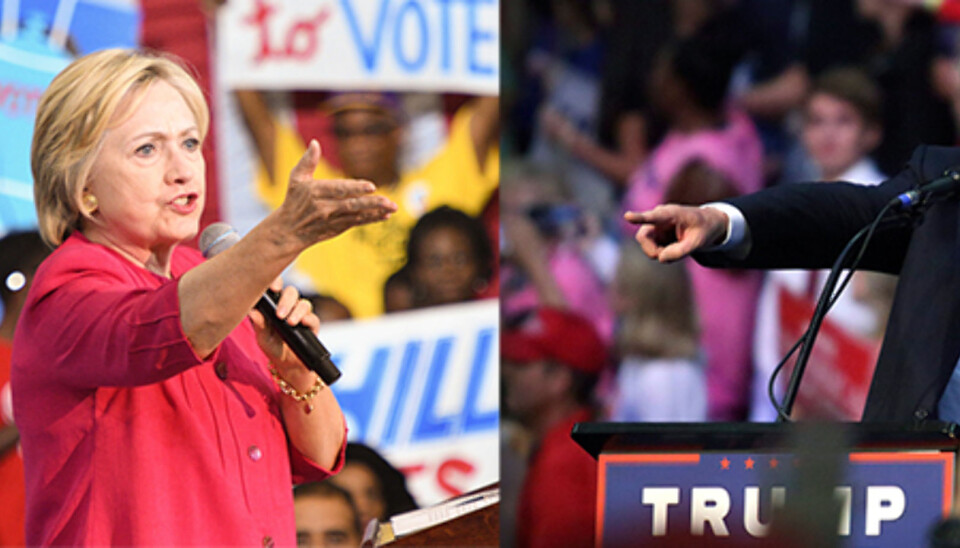
Trump, the «lost» middle class, and the politics of recognition
Our findings offer insight as to what may be driving support for Trump by people with the odds stacked against them, writes Erika Gubrium at HiOA. Tuesday morning she will tell more about the research.
OBS! Denne artikkelen er mer enn tre år gammel, og kan inneholde utdatert informasjon.
In this year’s presidential election, many on the left bemoan the fact that some people who struggle – particularly, white middle and working class people with little education and income – are making the seemingly contradictory choice to support Donald Trump. Disappointment leads to denouncement, more embittered by the week, as we are witness to Trump’s past and latest misdeeds.
For five years, I’ve been involved in groundbreaking social policy research in two international studies, where we have seen nearly universal connections between poverty, class and shame. Applied to the U.S. context, our findings offer insight as to what may be driving support for Trump by people with the odds stacked against them.
Managing shame: the «lost» middle class. Our current political discourse provides the perfect recipe for maximizing the shame of poverty. Both Democrats and Republicans emphasize the ideals of equal opportunity, the American Dream, and meritocracy, of «pulling yourself up by your bootstraps.» The shared ideal is that all American citizens have an equal chance for success, much of which depends on individual effort. Yet, for many, a wide gulf exists between the American Dream and everyday reality.
The American middle class has been «hollowed out» and blue-collar workers have experienced a collective move downward. A weakened union presence means these workers have lost a united arena for on-the-job protection and mobilization. With Bill Clinton’s promise to «end welfare as we know it» realized, struggling people have also had their safety net removed. What impact has this scenario had?
Our research findings show consistently that a loss of socioeconomic status leads to heightened shame. One feels shame about the things one cannot control – about what one is and how one is perceived by peers and society-at-large – about unwillingly falling short of societal ideals. We spoke with hundreds of struggling people across eight widely varying countries. Many told us they felt shame in connection with their economic struggles. Many felt shamed by a society that attributed their difficult circumstances to individual moral weakness. The impact of shame persisted «like a psychic scar that stubbornly refused to heal.»
Here, where the loss of the American dream meets the reality of heightened shame, we find Trump offering to <<make America great again>>.
Erika Gubrium
Many also noted it was difficult to acknowledge the shame they felt. They felt «small», unworthy, powerless, and had a strong desire to hide. Often, they managed their shame by refusing to recognize it. Instead, they externalized the blame and anger they felt, and they engaged in «othering»: some directed their anger upward, to those with power or influence, who seemingly remained disdainful of their hardship. Others directed anger downward, to those they deemed «less worthy». Shame acted to divide people living in difficult circumstances. It was incapacitating at a personal level and it weakened social solidarity.
An alternate strategy to the denial of shame is to actively recognize and refuse it, most notably through grassroots political engagement based on social identity. In the U.S., we currently see this in the Black Lives Matter movement, where social media has made it possible to reveal grievous instances of violence committed against African Americans. We see the success of the women’s movement in the fact that we have a female candidate for President who uses the slogan, «I’m with her». Yet how viable is this strategy for the marginalized white man?
If Americans are like the rest of the world, it is very likely that the loss of status for those expected to be at the higher reaches of the socio-economic ladder – white men in the struggling working and middle classes – may be keenly felt. Those who have traditionally been «in control» lack an oppressed identity from which to effectively challenge inequalities and refuse shame. In the land of the American Dream, where meritocracy is the rule and the white man is publically expected (if not accepted) to be among the most privileged, economic struggle takes a heavy personal toll. Those affected may feel a loss of control and shame over their situation. One response has been to cast anger directed up against the political elite, and down, at already marginalized groups, mirroring our research findings. The response to shame has stifled the possibility to build a broad social movement across class.
The politics of recognition. Here, where the loss of the American dream meets the reality of heightened shame, we find Trump offering to «make America great again» and to restore workers’ dignity – an offer so tempting that nothing Trump otherwise says detracts from it. Yet many on the left remain befuddled as to why struggling Americans vote as they do. In fact, they are openly disdainful. A sampling of statements that I’ve seen on the left: Trump supporters are «mostly uneducated», «eager for hatred», and «ignorant». Hillary Clinton herself has clumsily described «half of» Trump’s supporters as «sexist, racist, homophobic, xenophobic, Islamophobic» and hence «irredeemable». They belong in a «basket of deplorables».
Trump has paid attention. Taking his cue (and some supporters) from Bernie Sanders, he’s spoken directly to the lost middle class, challenging Republican and Democrat elites alike. Pledging to «help union members, coal miners and other low-wage Americans who have historically supported Democrats», he’s seemingly recognized the struggles of these voters. «These are the forgotten men and women of our country. People who work hard but no longer have a voice — I am your voice», Trump says. His «I’m with you» connects broadly.
Our country is faltering under the weight of extreme political, social, and economic division. Politicians and political movements on both left and right would do well to recognize the deeply negative and shaming impact that socioeconomic change has had on the lost middle class. Patronizing and derisive descriptions of Trump supporters only aggravate the shame and anger felt, pushing away those who are struggling, rather than building solidarity. A politics of recognition is the antidote. Many are suffering: what unites us all is the desire to live a worthwhile life. Our determination to understand will enable us to move away from divisive and shaming discourses, in order to build the bonds of social solidarity.
Breakfast session tuesday 1. november: The Future of Health and Welfare in Norway and the US - same challenges, different solutions? HiOAs Erika Gubrium starts this session with a lecture based on here research. Poverty, shame and social exclusion in Norway and The US. Implications for the 2016 US Presidential election.
Panel discussion: What are the major challenges for the next president? Is there anything to learn from the Nordic model, or is the American Way better? With Dr. Erika Gubrium, HiOA, Hilmar Mjelde, Senior Researcher at Uni Research and Vice-Dean R&D / Associate Professor, Ivan Harsløf, HiOA
Author bio: Erika Gubrium is Associate Professor in the Department of Social Work, Child Welfare and Social Policy at the Oslo and Akershus University College, where she leads the research group, “Society, Welfare and Policy.” Before moving to Norway in 2008, she worked as an organizer in the U.S. labor and feminist movements. Gubrium has since 2011, conducted research in several international studies on the connections between poverty and shame, with a focus on how poverty is experienced. She has co-edited of the book, The Shame of It: Global Perspectives on Anti-Poverty Policies (University of Chicago Press) and has contributed to Poverty and Shame: Global Experiences (Oxford University Press).
Check also out this podcast with Erika Gubrium:
(Foto and podcast: HiOA)






Logg inn med en Google-konto, eller ved å opprette en Commento-konto gjennom å trykke på Login under. (Det kan være behov for å oppdatere siden når man logger inn første gang)
Vi modererer debatten i etterkant og alle innlegg må signeres med fullt navn. Se Khronos debattregler her. God debatt!